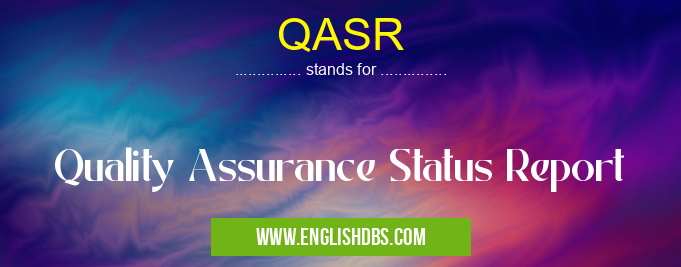What does QASR mean in QUALITY ASSURANCE & CONTROL
QASR is an abbreviation that stands for Quality Assurance Status Report. It is a comprehensive report on the current status of quality assurance within an organization or project. The purpose of a QASR is to provide a snapshot of the organization's quality management system, identify areas for improvement, and ensure compliance with regulatory requirements.

QASR meaning in Quality Assurance & Control in Miscellaneous
QASR mostly used in an acronym Quality Assurance & Control in Category Miscellaneous that means Quality Assurance Status Report
Shorthand: QASR,
Full Form: Quality Assurance Status Report
For more information of "Quality Assurance Status Report", see the section below.
Key Elements of a QASR
A typical QASR includes the following key elements:
- Introduction: Provides an overview of the report's purpose, scope, and audience.
- Quality Management System: Describes the organization's quality management system, including its policies, procedures, and processes.
- Quality Assurance Activities: Outlines the specific quality assurance activities conducted during the reporting period, such as audits, inspections, and testing.
- Quality Metrics: Presents data on key quality metrics, such as defect rates, customer satisfaction, and process efficiency.
- Areas for Improvement: Identifies areas where the organization's quality management system can be improved.
- Action Plan: Outlines the corrective actions that will be taken to address the identified areas for improvement.
- Compliance: Summarizes the organization's compliance with relevant regulatory requirements and industry standards.
- Conclusion: Summarizes the findings of the QASR and provides recommendations for future improvement.
Benefits of QASR
A well-written QASR can provide numerous benefits to an organization, including:
- Improved Quality Assurance: By providing a comprehensive overview of the organization's quality management system, a QASR helps to identify areas for improvement and ensure that quality standards are being met.
- Enhanced Compliance: A QASR can help organizations to demonstrate compliance with regulatory requirements and industry standards, reducing the risk of legal penalties and reputational damage.
- Increased Customer Satisfaction: By focusing on quality improvement, a QASR can lead to increased customer satisfaction and loyalty.
- Reduced Costs: Improved quality assurance can reduce the cost of rework, scrap, and customer complaints, resulting in increased profitability.
Essential Questions and Answers on Quality Assurance Status Report in "MISCELLANEOUS»QUALITY"
What is a Quality Assurance Status Report (QASR)?
A QASR is a comprehensive document that provides an overview of the quality assurance (QA) activities performed during the development and testing phases of a software product. It summarizes the results of QA testing, identifies potential risks and issues, and recommends actions to address them.
What are the key components of a QASR?
A typical QASR includes sections on:
- Project background and objectives
- QA activities performed
- Test results and defect tracking
- Risk assessment and mitigation plans
- Management review and sign-off
What is the purpose of a QASR?
A QASR serves several important purposes:
- Provides a comprehensive overview of QA activities
- Helps identify and mitigate potential risks and issues
- Documents QA processes and results
- Facilitates communication between development teams, QA teams, and management
Who is responsible for creating and maintaining a QASR?
The QA team is typically responsible for creating and maintaining the QASR. However, it is a collaborative effort that involves input from development teams, project managers, and other stakeholders.
What are the benefits of using a QASR?
A well-maintained QASR offers numerous benefits, including:
- Improved software quality and reliability
- Reduced risks and defects
- Enhanced communication and collaboration
- Streamlined regulatory compliance
Final Words: A QASR is a valuable tool for organizations that are committed to continuous quality improvement. By providing a comprehensive overview of the organization's quality management system, identifying areas for improvement, and ensuring compliance with regulatory requirements, a QASR can help organizations achieve their quality goals and improve their overall performance.
